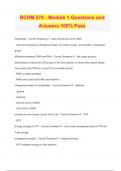Bchm 270 module 2 - Study guides, Class notes & Summaries
Looking for the best study guides, study notes and summaries about Bchm 270 module 2? On this page you'll find 4 study documents about Bchm 270 module 2.
All 4 results
Sort by

-
BCHM 270 Module 2 Test With Solution
- Exam (elaborations) • 13 pages • 2024
- Available in package deal
-
- $9.49
- + learn more
BCHM 270 Module 2 Test With Solution...

-
BCHM 270 Module 2 Questions and Answers 100% Pass
- Exam (elaborations) • 10 pages • 2024
-
- $12.49
- + learn more
BCHM 270 Module 2 Questions and Answers 100% Pass Transient interactions between molecules that can be continuously broken and reformed - Correct Answer️️ -non-covalent bonds What type of scenario would make non-covalent bonds stronger? - Correct Answer️️ - when many are combined together together in a macromolecule or between molecules electrostatic interactions are also called: - Correct Answer️️ -ionic interactions or salt bridges Interactions between positive and negative...

-
BCHM 270- Module 4 Questions and Answers 100% Pass
- Exam (elaborations) • 29 pages • 2024
-
- $12.49
- + learn more
BCHM 270- Module 4 Questions and Answers 100% Pass Carbohydrates (saccharides) - Correct Answer️️ -- the most abundant compound found in nature and - have many cellular functions: provide energy in the diet provide a storage form of energy form components of cell membrane Classifications of Monosaccharides - Correct Answer️️ -- simplest carbohydrate and are single sugar molecules Classified according to: - the name of carbons they contain 3 carbon: triose 4 carbon: tetrose ...

-
BCHM 270 - Module 1 Questions and Answers 100% Pass
- Exam (elaborations) • 11 pages • 2024
-
- $12.49
- + learn more
BCHM 270 - Module 1 Questions and Answers 100% Pass Nucleotide - Correct Answer️️ -- basic structural unit for DNA - each one contains a nitrogenous base, a 5-carbon sugar, and at least 1 phosphate group difference between DNA and RNA - Correct Answer️️ -- the sugar group is deoxyribose (missing the OH group on the 2nd carbon) or ribose (this makes ribose more polar than DNA so it won't form a double strand) - RNA is single stranded - RNA used uracil and DNA uses thymine nitro...

Do you wonder why so many students wear nice clothes, have money to spare and enjoy tons of free time? Well, they sell on Stuvia! Imagine your study notes being downloaded a dozen times for $15 each. Every. Single. Day. Discover all about earning on Stuvia


